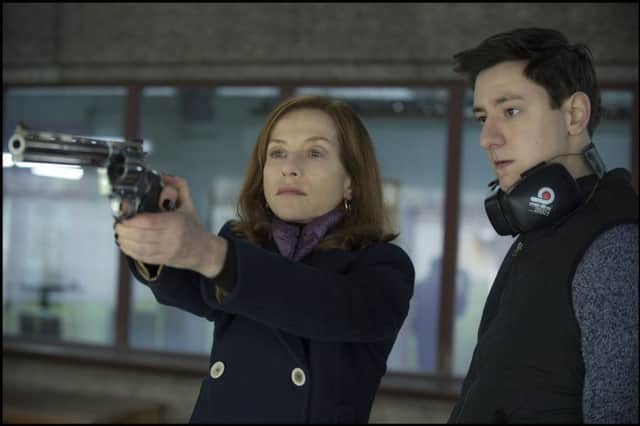Film reviews: Elle | Kong: Skull Island | The Love Witch


Elle (18) *****
Kong: Skull Island (12A) *
The Love Witch (15) ****
Elle starts as it means to go on: unpredictably. Over black we hear the sounds of a sexual assault in progress. A few seconds later we see Isabelle Huppert being attacked and raped by a man in a ski mask. It’s brutal and relentless, the camera observing the crime as matter-of-factly as her pet cat watching from the sidelines. When the ordeal is over, Huppert’s Michèle doesn’t cower and cry or call the police. She calmly cleans up, locks the door and takes a bath. The bruise on her face and bloodstained bubbles between her legs are the only indicators of the violation she’s endured. In all other ways she refuses to yield to expected notions of victimhood.
It’s this response that makes Paul Verhoeven’s first film in a decade such a provocative, brain-twisting proposition. The Dutch director made his name with slyly satirical, frequently misunderstood genre fare such as Robocop, Starship Troopers and Basic Instinct – outrageously entertaining films that utilised disturbing imagery and ideas to critique the very culture that spawned and sustained them. Elle is a more grounded and realistic film, but because its protagonist’s response to her ordeal doesn’t conform to the narrative beats of a movie about rape, it’s often as funny as it is shocking. When Michèle tells her friends about the attack, for instance, she does so casually, over dinner, just as champagne is delivered to the table. It’s like something out of a French comedy of manners and Huppert delivers her lines with deadpan comic flair. Verhoeven maintains this tone throughout, particularly as Michèle tries to deal with various familial problems relating to her narcissistic mother, her hapless son and her unsuccessful ex-husband. But the suppressed trauma of the attack is never far from the action either. The opening scene is replayed in flashback after flashback to avoid letting us get too comfortable; Michèle’s job as the successful CEO of a video game company that trades in disturbing virtual fantasies results in frequent cuts to hyper-violent sexual imagery, and Michèle herself becomes embroiled in a weird game of cat-and-mouse with her attacker as she attempts to control her reality the way a gamer would the characters in one of her products.
Advertisement
Hide AdVerhoeven doesn’t give much away in terms of what he wants us to feel about any of this and he further muddies the waters with a disturbing backstory for Michèle that taps into a key theme: how presenting images in a certain light can distort our impressions of something in lasting and damaging ways. Unlike Michael Haneke – to whose work this has inevitably been compared (not least because of Huppert’s involvement) – Verhoeven never gives the impression that he’s trying to force some form of moral absolutism on us, though. Elle is unsettling precisely because of how compelling he’s made it and he leaves it to us to wrestle with the implications of its controversial narrative twists and turns. But it’s Huppert who deserves most credit for Elle’s success as a movie. Inscrutable and unpredictable, her psychologically nuanced performance doesn’t just withstand the film’s provocations: it pushes back against them, transforming Elle into a remarkable character study of someone unwilling to be defined by anyone or anything.
Kong: Skull Island is one of the
most incompetent blockbusters of recent years, a stark lesson in why not every well-connected male director with a boilerplate indie film to their name deserves a $200m budget for their sophomore feature. Having made the earnest, Stand By Me-riffing coming-of-age movie The Kings of Summer, Jordan Vogt-Roberts here re-imagines King Kong as a goofy comedy adventure film set against the backdrop of the Vietnam War. Featuring an over-qualified (and pretty expensive) cast contending with the kind of dialogue, plotting and muddled set-pieces not seen since Cannon’s cheapo wannabe blockbusters of the 1980s, this is more blunder than wonder. Tom Hiddleston and Room Oscar-winner Brie Larson take the leads as, respectively, an SAS tracker and photojournalist recruited in the wake of the fall of Saigon to accompany an American military expedition to the as-yet unchartered Skull Island to investigate rumours of fantastical creatures. Kong himself is revealed early on when the great ape interrupts a helicopter bombing raid, a scene Vogt-Roberts no doubt conceived as a fun, monster-movie riff on the Ride of the Valkyries scene from Apocalypse Now, but which he executes with such ineptitude that the Nam backdrop can’t help but seem like an unintentionally appropriate symbol of what happens when you throw too much money and hardware at something with no clear idea of the objective. Indeed, this is so devoid of awe and wonder, so lacking in a basic understanding of what King Kong is all about, it feels as if no one involved has seen the 1933 original, or even Peter Jackson’s loving 2006 remake. What a waste.
The Love Witch is the latest from multi-tasking writer/director/editor/producer/costume designer Anna Biller. Like her debut, Viva, it’s a meticulously designed genre pastiche with a subversive take on sexual politics. Shot in the style of a 1960s Technicolour trash-fest, but set – amusingly – in the present day, it revolves around a scorned woman whose plan to use potions and tricks to make men fall in love with her takes a gruesome turn when they start wanting emotional honesty. Embracing Russ Meyer-style kitsch, but overturning the horror genre’s sexist tropes, Biller delivers wry comment on the objectification of women in a film that’s as smart as it is sumptuous. ■